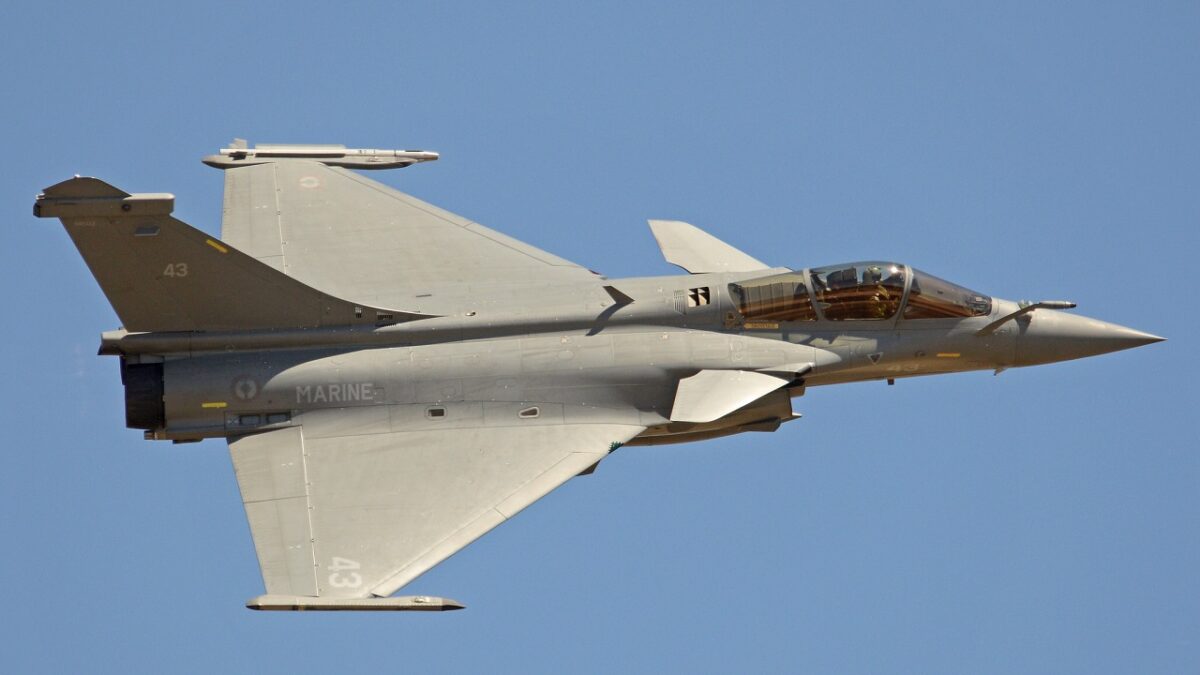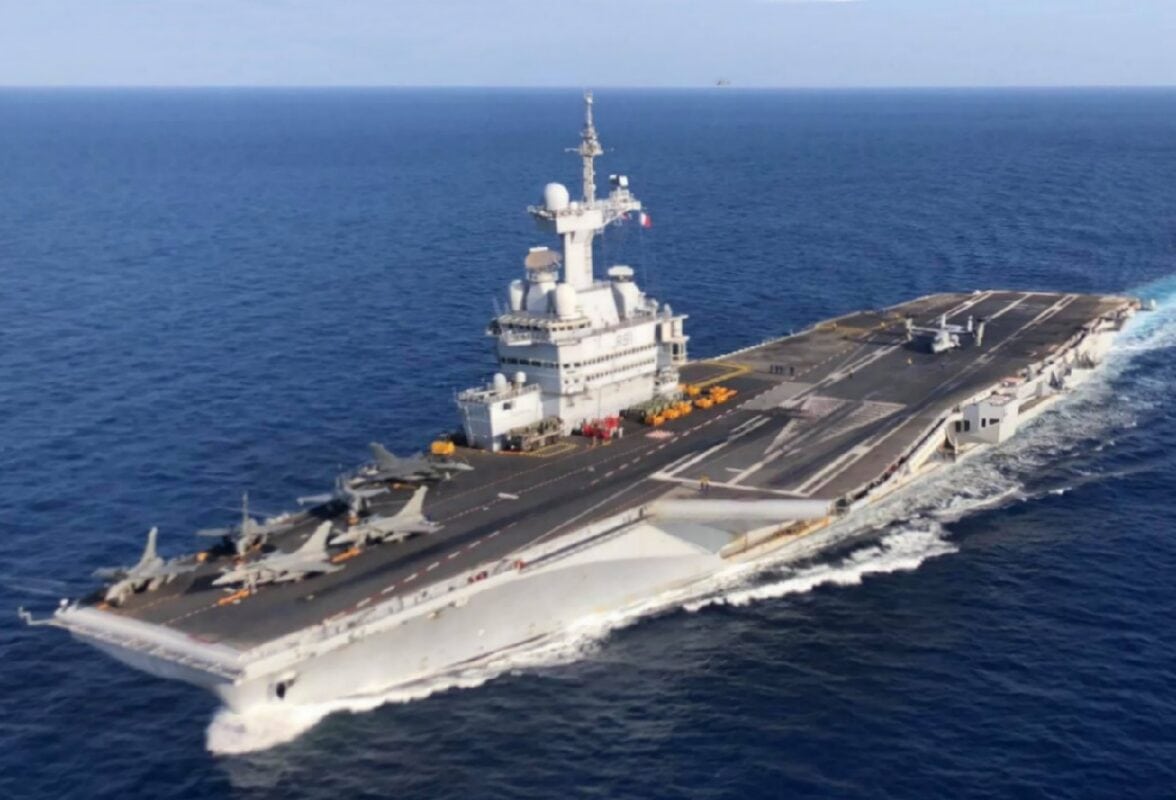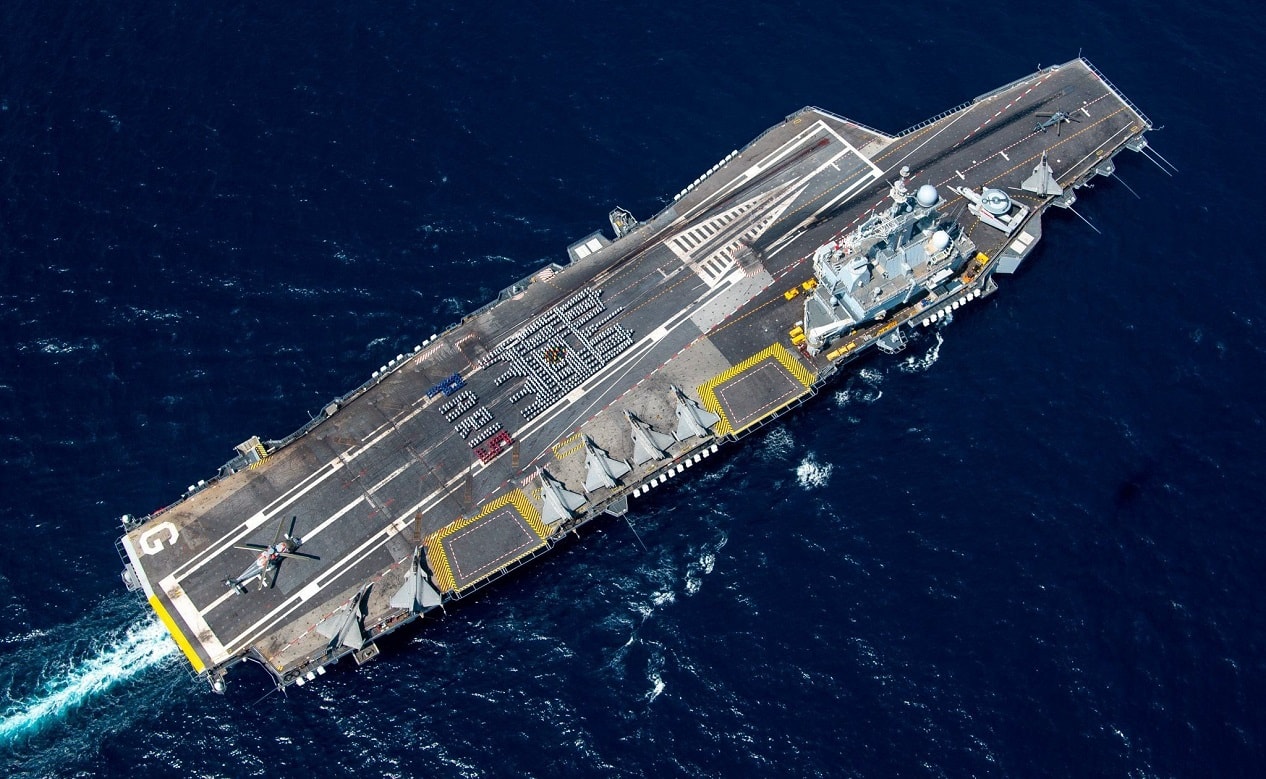In recent years, we at 19FortyFive have published several articles on how Russia’s repeated attempts to build a nuclear-powered aircraft carrier have ended in miserable and ignominious failure.
It is no small source of embarrassment for Vladimir Putin and his Russian Navy admirals that the only two countries who have successfully launched and deployed nuke carriers are both Western powers and NATO members to boot: the United States and France.
The U.S. Navy has 11 such mighty warships whilst the French Navy (Marine Natiionale) has one, the Charles de Gaulle.
Let’s take a more detailed look at France’s supercarrier.
The namesake of a Historical Icon
As any student of WWII and the Cold War will instantly figure out, the Charles de Gaulle (hull number R91, affectionately nicknamed “CDG”) was named for France’s most revered statesman of the 20th century. Charles de Gaulle wasn’t universally loved, though he had a strong influence on the country. So then, it is fitting that the ship has been designated the flagship of the French Navy.
She was built by the DCN (Direction des Constructions Navales) Brest naval shipyard in Brittany; her keel was laid on April 14, 1989, she was launched on May 7, 1994, and she made her maiden voyage on 18 May 2001. “CDG” was built as the replacement for the early 1960s-vintage Clemenceau-class carriers, which consisted of Clemenceau and Foch. The ship has a hull length of 261.5 meters (858 feet), a beam of 64.36 meters (211.2 feet), a height of 66.5 meters (218 meters), and a draught of 9.43 meters (30.9 feet), with a displacement of 38,000 tons. Those impressive dimensions accommodate 1,150 ship’s crew, 550 aircrewmen, and 50 air support staff, along with short-term accommodation for 800 marines (Fusiliers marins).
In terms of the firepower that the de Gaulle can bring to bear against potential adversaries, the ship hosts up to 40 aircraft, including 30 Dassault Rafale M multirole fighters (prior to 2016 this role was filled by the Dassault-Breguet Super-Étendard), two E-2C Hawkeyes, two NFH Caiman Marine helicopters, one Eurocopter AS565 Panther, and two AS365 Dauphin (“Dolphin”) Pedro choppers. There are four 8-cell Sylver launchers for carrying MBDA Aster 15 surface-to-air missiles (SAMs) and two 6-cell Sacral launchers wielding the Mistral short-range missile. For short-range last-ditch self-defense, the ship packs eight Giat 20F2 20mm cannons.

Operated by Flottille 12F, Aeronavale, based at Landivisiau.
Seen during a practice display routine at Zaragoza Air Base, Spain, during the 2016 NATO Tiger Meet (NTM).
de Gaulle On-Duty
“CDG” was blooded in combat during Operation Enduring Freedom (OEF), dispatching her first combat missions over Afghanistan on December 19, 2001, eventually carrying out a total of 770 sorties in support of anti-Taliban and anti-al-Qaeda activities, averaging 12 missions per day. Notwithstanding the tensions that would later develop between the U.S. and France over Iraq policy, on March 11, 2002, then-POTUS George W. Bush expressed his gratitude for the French Naval contributions to OEF: “(O)ur good ally, France, has deployed nearly one-fourth of its navy to support Operation Enduring Freedom.” Nine years later, de Gaulle deployed to the Mediterranean Sea to help enforce a no-fly zone over Gaddafi’s Libya.
More recently, this past March of 2022, on the heels of Vladimir Putin’s commencement of his “special military operation” against Ukraine, the de Gaulle and her air wing began supporting NATO’s enhanced Vigilance Activities in the Black Sea. As per a French Navy statement released on Twitter at the time:
“The French CSG set sail again yesterday after a few days of port call in Cyprus. Clemenceau22 continues, but the mission evolves to adapt to the current geopolitical situation. The flexibility of the carrier vessel nuclear and her escort is once again a major asset. The diversity of the CSG’s naval and air assets, its ability to last at sea and its freedom of action, allow France and its allies to have at their disposal a flexible instrument of power, capable of adapting very quickly. The detection capabilities of the E2-C Hawkeye will notably enable the carrier strike group to assess the surface situation at the Europe maritime borders, especially in the Black Sea. Deployed yesterday in CJTFOIR to fight against Daech [sic], engaged today for the benefit of the reassurance of our NATO partners on the eastern flank of Europe, the carrier strike group continues to operate for the protection of France and the European continent.”

190424-M-BP588-1005 U.S. 5TH FLEET AREA OF OPERATIONS (April 24, 2019) A U.S. Marine MV-22 Osprey assigned to the 22nd Marine Expeditionary Unit sits on the flight deck of France’s Marine Nationale aircraft carrier FS Charles De Gaulle (R 91). This was the second time that Ospreys have landed aboard the French vessel. Marines and Sailors assigned to the 22nd MEU and Kearsarge Amphibious Ready Group are currently deployed to the U.S. 5th Fleet area of operations in support of naval operations to ensure maritime stability and security in the Central region, connecting the Mediterranean and the Pacific through the western Indian Ocean and three strategic choke points. (U.S. Marine Corps photo by Maj. Joshua Smith/Released)
MORE: The F-35 Now Comes in Beast Mode
MORE: Why the U.S. Navy Tried to Sink Their Own Aircraft Carrier
Christian D. Orr is a former Air Force officer, Federal law enforcement officer, and private military contractor (with assignments worked in Iraq, the United Arab Emirates, Kosovo, Japan, Germany, and the Pentagon). Chris holds a B.A. in International Relations from the University of Southern California (USC) and an M.A. in Intelligence Studies (concentration in Terrorism Studies) from American Military University (AMU). He has also been published in The Daily Torch and The Journal of Intelligence and Cyber Security. Last but not least, he is a Companion of the Order of the Naval Order of the United States (NOUS).

